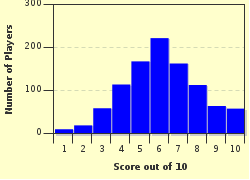Quiz Answer Key and Fun Facts
1. By what name do linguists call "R-sounds"?
2. Spanish words with a double R have the most common kind of R-sound in the world's languages. What does it sound like?
3. Linguists call the French and German growling-in-the-throat R-sound a "fricative"-- it's produced with the tongue close enough to some other part of your mouth that air flowing out of the mouth is turbulent and noisy. For the French and German "R," what part of your mouth (and tongue) is this?
4. The exotic "alveolar fricative trill" sounds roughly like "rrrrjjjjj," a trilled "R" followed by a "J" sound. It's the "r with a hacek over it" in the name of the famous Classical composer Dvorak. It's indigenous to which Slavic language?
5. The "R-sound" found in most dialects of English is extremely complicated. What would you have to do with your tongue in order to produce it?
6. At about what age do English-speaking children learn to say their R's?
7. An exceedingly sneaky question about an exceedingly sneaky letter. How IS the R-sound classified by linguists, anyway?
8. No quiz "brought to you by the letter R" would be complete without a question about "R" the letter. So, here it is. Did the Greek alphabet ever have a "rho" that looked like the "R" in the Roman alphabet? (By implication, if you say "no," the Greek alphabet only ever had a rho which looks like the "P" in the Roman alphabet, and the extra diagonal stroke was a purely Roman invention.)
9. People in one particular region of the USA are famous for dropping R's left and right. In which of these cities would you "paahk yah kaaah?"
10. It's fashionable to perform Shakespeare in a British accent, where R's are sometimes not pronounced. But-- would Shakespeare have pronounced his R's?
Source: Author
pu2-ke-qi-ri
This quiz was reviewed by FunTrivia editor
agony before going online.
Any errors found in FunTrivia content are routinely corrected through our feedback system.


